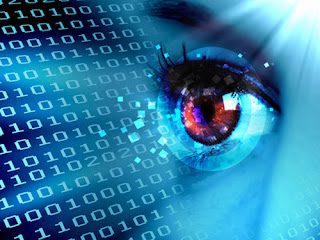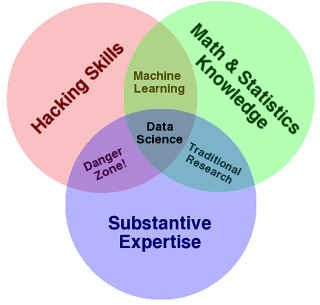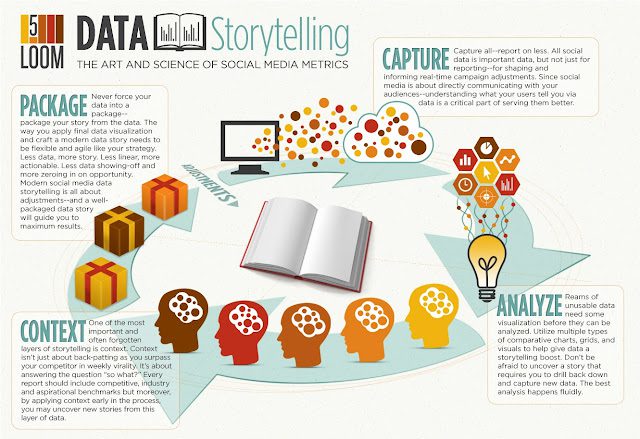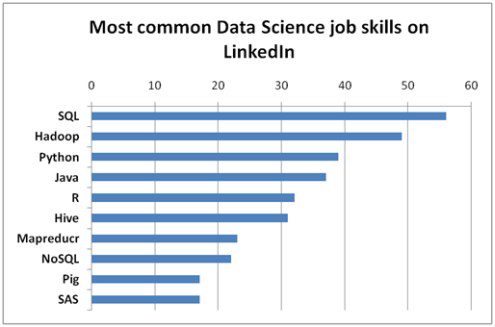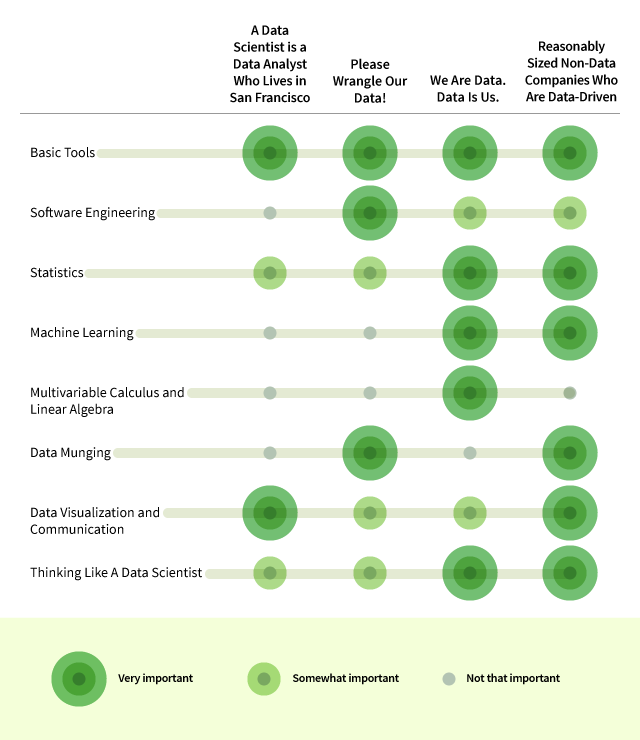Data Science – The Process of Capturing, Analyzing and Presenting Business Intelligence with Skill – DataReality
Programming and Database skills
Business Domain Expertise and Knowledge
Data Modeling, Warehouse, and Unstructured Data Skills
Analyze
Statistical Tool Skills
Math skills
Present
Visualization Tool Skills
Storytelling Skills
Other Opinions and Lists
A Nice Delineation from “DATA SCIENTIST: WHAT SKILLS DOES IT REQUIRE?“
Is the garden-variety spreadsheet jockey a data scientist? Yes, to the extent that they build statistical models and use the tool to find non obvious patterns in structured data, they are engaging in a form of data science. But if this exploration is not their primary job function, they are merely dabbling, not specializing.
Is BI report-building or OLAP cube-development data science? No. Those endeavors, although important, revolve around obvious data patterns — obvious in the sense that an organization has chosen to embed them in repeatable views and access patterns.
Data science is all about asking questions. You engage in it whenever you interactively and iteratively search for deep, hidden patterns.
Top Skill-set Requirements to be a Data Scientist
- Analytical skill-set
- Mathematics / statistics (including experimental design)
- Domain knowledge (i.e. Industry specific processes where analytic are applied)
- Technology / data
- Communication skills (story-telling)
- Curiosity (willingness to challenge the status quo)
- Collaboration
- Commercial acumen/ Strategic
- Customer-centric
- Problem-solving skills
- Proactive
- Diverse Technologies: Hadoop, Java, Python, C++, ECL, NoSQL, HBase, CouchDB
- Mathematics
- Business Skills
- Visualization: Flare, HighCharts, AmCharts, D3.js, Processing, Google Visualization API, and Raphael.js
- Innovation
How to hire data scientists and get hired as one
- SQL,
- Statistics,
- Predictive modeling and
- Programming (probably Python)
- Know the core competencies
- Know a litle more
- Embrace online learning
- Learn to tell a story
- Prepare to be tested (aka “Your pedigree means nothing”).
- Exercise creativity
Data Scientist Skills Needed
- Commitment,
- Creativity,
- Business savvy
- Presentation,
- Intuition
From the O’Reilly Strata Conference
- Open-source tools (G)
- Statistics (A)
- Presentation (P)
Winning with Big Data
Northwestern University – Master of Science in Predictive Analytics degree
- CIS 317-DL Database Systems Design & Impl — This course covers the fundamentals of database design and management. Topics include the principles and methodologies of database design, database application development, normalization, referential integrity, security, relational database models, and database languages. Principles are applied by performing written assignments and a project using an SQL database system
- CIS 435-0 Data Warehouse & Data Mining —This course provides an introduction to data mining, with a few hours of focus on data warehousing as one of the commonly used data sources for data-mining applications. Students learn data-mining applications, core concepts, and algorithms. Among these algorithms are supervised (Naive Bayes, Decision Tree, and Neural Network) and non supervised (Association Rules, commonly used for market basket analysis, and Clustering) algorithms. Students learn via experimentation; they observe the outcome of applying data mining algorithms to real-life data
- PREDICT 401-DL Statistical Analysis — Students learn to apply statistical techniques to the processing and interpretation of data from various industries and disciplines. Topics covered include probability, descriptive statistics, study design and linear regression. Emphasis will be placed on the application of the data across these industries and disciplines and serve as a core thought process through the entire Predictive Analytics curriculum.
- PREDICT 410-DL Predictive Modeling I — This course introduces statistical models as they are used in predictive analytics. The course reviews traditional linear and generalized linear models, including multiple regression and logistic regression. It addresses issues of model specification and model selection, as well as best practices in developing models for management. The course also demonstrates the application of multivariate methods in predictive analytics
- PREDICT 411-DL Predictive Modeling II — Drawing upon examples from economics and business, this course provides an in-depth review of modeling practice. Special attention is paid to linear predictor and error structure specification for time series models. The course reviews econometric methods, including maximum likelihood estimation, two-stage and three-stage least squares, seemingly unrelated regressions, and simultaneous equation estimation. The course shows how to use autoregressive integrated moving average (ARIMA) models in time series forecasting. The course also demonstrates the application of survival/duration analysis in predictive analytics
- LEADERS 481-DL Leadership — The purpose of this course is to identify the fundamental leadership behaviors that enable people to excel in their careers, and to help students apply these behaviors to personal and professional success. The course builds from the basic premise that leadership is learned, and looks at the theory and practice of leadership at the individual and organizational level. The course will explore definitions of leadership, the importance of leadership, leadership styles, the role of vision and integrity, the importance of giving and receiving feedback, how to lead change and solve problems, effective teamwork, and communication strategies
- PREDICT 402-DL Analytics and Data Collection — This course will describe the appropriate uses of analytics and its limitations while defining how to approach the various stakeholders within an organization. Included will be a review of the ethical, regulatory, and compliance issues related to a given business problem and/or solution. Time will be spent interpreting performance-based organizational issues while concurrently identifying solutions for these same performance-based organizational issues. In addition, time will be spent identifying best practices to plan for engaging, implementing, and sustaining organizational change.
Looks like it’s time to update the generous and insightful contributions of thought from others on this article. Here’s skills recommedations I’m seeing from other working data scientists.
Technical Skills: Analytics
- Education – Data scientists are highly educated – 88% have at least a Master’s degree and 46% have PhDs – and while there are notable exceptions, a very strong educational background is usually required to develop the depth of knowledge necessary to be a data scientist. Their most common fields of study are Mathematics and Statistics (32%), followed by Computer Science (19%) and Engineering (16%).
- SAS and/or R – In-depth knowledge of at least one of these analytical tools, for data science R is generally preferred.
Technical Skills: Computer Science
- Python Coding – Python is the most common coding language I typically see required in data science roles, along with Java, Perl, or C/C++.
- Hadoop Platform – Although this isn’t always a requirement, it is heavily preferred in many cases. Having experience with Hive or Pig is also a strong selling point. Familiarity with cloud tools such as Amazon S3 can also be beneficial.
- SQL Database/Coding – Even though NoSQL and Hadoop have become a large component of data science, it is still expected that a candidate will be able to write and execute complex queries in SQL.
- Unstructured data – It is critical that a data scientist be able to work with unstructured data, whether it is from social media, video feeds or audio.
Non-Technical Skills
- Intellectual curiosity – No doubt you’ve seen this phrase everywhere lately, especially as it relates to data scientists. Frank Lo describes what it means, and talks about other necessary “soft skills” in his guest blog posted a few months ago.
- Business acumen – To be a data scientist you’ll need a solid understanding of the industry you’re working in, and know what business problems your company is trying to solve. In terms of data science, being able to discern which problems are important to solve for the business is critical, in addition to identifying new ways the business should be leveraging its data.
- Communication skills – Companies searching for a strong data scientist are looking for someone who can clearly and fluently translate their technical findings to a non-technical team, such as the Marketing or Sales departments. A data scientist must enable the business to make decisions by arming them with quantified insights, in addition to understanding the needs of their non-technical colleagues in order to wrangle the data appropriately. Check out our recent flash survey for more information on communication skills for quantitative professionals
- SQL
- Data Visualization
- Communication Skills
- Hadoop
- Spark
- Python
- Statistics
- R
- Creativity
- Basic Tools: R or Python, and a database querying language like SQL.
- Basic Statistics: At least a basic understanding of statistics.
- Machine Learning: This can mean things like k-nearest neighbors, random forests, ensemble methods – all of the machine learning buzzwords.
- Multivariable Calculus and Linear Algebra: Understanding these concepts is most important at companies where the product is defined by the data and small improvements in predictive performance or algorithm optimization can lead to huge wins for the company.
- Data Munging: Some examples of data imperfections include missing values, inconsistent string formatting (e.g., ‘New York’ versus ‘new york’ versus ‘ny’), and date formatting (‘2014-01-01’ vs. ‘01/01/2014’, unix time vs. timestamps, etc.).
- Data Visualization & Communication: When it comes to communicating, this means describing your findings or the way techniques work to audiences, both technical and non-technical.
- Software Engineering: If you’re interviewing at a smaller company and are one of the first data science hires, it can be important to have a strong software engineering background.
- Thinking Like A Data Scientist: Companies want to see that you’re a (data-driven) problem solver.
TOP 10 DATA SCIENCE SKILLS, AND HOW TO LEARN THEM by EILEEN MCNULTY
- Analytics- the SAS Enterprise Business Intelligence Course – https://support.sas.com/training/us/paths/bi.html
- Machine Learning- Coursera – https://www.coursera.org/course/ml
- Statistics- Google Tech Talks’ Stats 202 – https://www.youtube.com/watch?v=zRsMEl6PHhM&list=PLncs4sEkVKBr_…
- R -Coursera’s Computing for Data Analysis – https://www.coursera.org/course/compdata
- Python- Codecademy – http://www.codecademy.com/tracks/python
- SQL- GalaXQL – http://sol.gfxile.net/galaxql.html
- Algorithms- Udacity’s Intro to Algorithms – https://www.udacity.com/course/cs215
- Hadoop- Udemy’s “Become a Certified Hadoop Developer” – https://www.udemy.com/hadoop-tutorial/
- Data Mining- Coursera’s “Pattern Discovery in Data Mining” – https://www.coursera.org/course/patterndiscovery
- MATLAB10. MATLAB- MIT’s Introduction to MATLAB – http://ocw.mit.edu/courses/electrical-engineering-and-computer-scie…
How to Become a Data Scientists | Data Scientist Salary
Technical Skills
- Math (e.g. linear algebra, calculus and probability)
- Statistics (e.g. hypothesis testing and summary statistics)
- Machine learning tools and techniques (e.g. k-nearest neighbors, random forests, ensemble methods, etc.)
- Software engineering skills (e.g. distributed computing, algorithms and data structures)
- Data mining
- Data cleaning and munging
- Data visualization (e.g. ggplot and d3.js) and reporting techniques
- Unstructured data techniques
- R and/or SAS languages
- SQL databases and database querying languages
- Python (most common), C/C++ Java, Perl
- Big data platforms like Hadoop, Hive & Pig
- Cloud tools like Amazon S3
Business Skills
- Analytic Problem-Solving: Approaching high-level challenges with a clear eye on what is important; employing the right approach/methods to make the maximum use of time and human resources.
- Effective Communication: Detailing your techniques and discoveries to technical and non-technical audiences in a language they can understand.
- Intellectual Curiosity: Exploring new territories and finding creative and unusual ways to solve problems.
- Industry Knowledge: Understanding the way your chosen industry functions and how data are collected, analyzed and utilized
Certifications
Certified Analytics Professional (CAP)
http://www.informs.org/certification
Cloudera Certified Professional: Data Scientist (CCP:DS)
http://www.cloudera.com/content/cloudera/en/training/certification/…
EMC: Data Science Associate (EMCDSA)
https://education.emc.com/guest/certification/framework/ds.aspx
SAS Certified Predictive Modeler using SAS Enterprise Miner 7
http://support.sas.com/certify/creds/pm.html
Professional Organizations for Data Scientists
Data Science Association
http://www.datascienceassn.org/
International Institute for Analytics (IIA)
http://www.iianalytics.com/
International Machine Learning Society (IMLS)
http://www.machinelearning.org/
Institute for Operations Research and the Management Sciences (INFORMS)
https://www.informs.org/
SIGKDD
http://www.sigkdd.org/
What are the most valuable skills to learn for a data scientist now? On Quora from Raja Tanveer Iqbal
- Curiosity About Data and Passion for Domain: If you are not passionate about the domain/business and curious about data then it is unlikely that you will succeed in a data scientist role.
- Soft Skills: Communication and influencing without authority. Being a good story teller is also something that helps.
- Math/Theory: Machine Learning. Stats and Probability 101. Optimization would be icing on the cake.
- CS/Programming: At least one scripting language (I prefer python). Decent algorithms and DS skills, to be able to write code that can analyze a lot of data efficiently.
- Big Data and Distributed Systems: Understanding of basic MapReduce concepts, Hadoop and Hadoop file system and least one language like Hive/Pig.
- Visualization: Ability to create simple yet elegant and meaningful visualization.
Also noteworthy:

